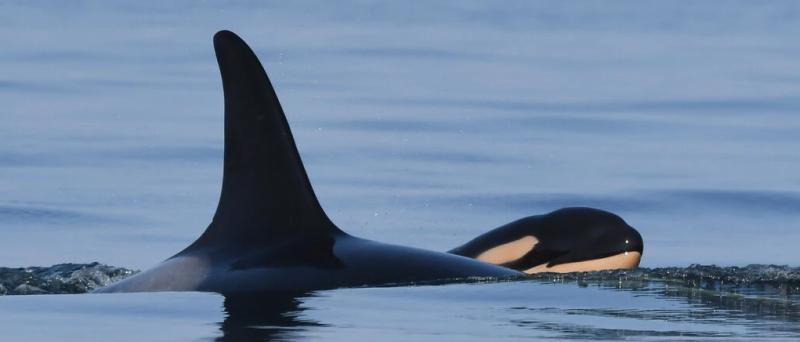
The new calf, J57, with its mother, J35. Credit: Katie Jones, via Center for Whale Research
In the summer of 2018, a female orca whale became of a symbol of the perilous state of the Southern Resident orca pods of the Pacific Northwest. The whale, designated J35 by researchers, had given birth to a calf that died. The mother orca carried the calf with her for 17 days in what appeared to be an act of mourning. Now two summers later, orca J35 has given birth again to what is described as a “robust and lively” new calf, in what may be a ray of hope for the endangered Southern Resident population.
For the last five years, the Southern Resident orca population has been in trouble, suffering from a scarcity of fish, noise pollution from ships and boats, and toxic pollutants in their food chain. The Southern Resident population includes three pods that largely stay near Washington State and British Columbia. They numbered 88 when they were listed as endangered in 2005 and have since dwindled to 73, including the newborn calf.
In recent years, many of the population’s pregnancies have failed, and about 40 percent of the calves who are born die in their first year. Nevertheless, the new calf, designated by researchers as J57, appears to be thriving.
The New York Times quotes Ken Balcomb, founding director of the Center for Whale Research, documented the newest calf, in the Strait of Juan de Fuca, which separates the Olympic Peninsula of Washington from Vancouver Island, who said that “the baby looked very robust and lively, so I have good expectations for this one surviving.”
He added that he was hopeful that recent efforts could bring back more robust runs of chinook salmon, the primary food source for the Southern Resident orcas. He pointed to the removal of a dam on the Elwha River, which empties into the strait, as a possible turning point.
Two other whales in the pods also are pregnant, Mr. Balcomb said. Researchers watch each of them closely, he said, because the pods now have only a half-dozen families that have been really successful at producing calves. J35 had a calf in 2010 that is still alive.

Meanwhile, there’s this:
https://www.theguardian.com/environment/2020/sep/13/the-tale-of-the-killer-whales
Perhaps the orca have convened an assembly, concluded that negotiation is impossible, that we’re too preoccupied with ourselves to be suitable for cohabitation?
One thing’s for sure: when we have 50,000 orca and 7.6 billion humans worldwide, the problem is not that we have too many orca.
Could the Orca’s mistake the boat for a shark and attack it, or other boats?